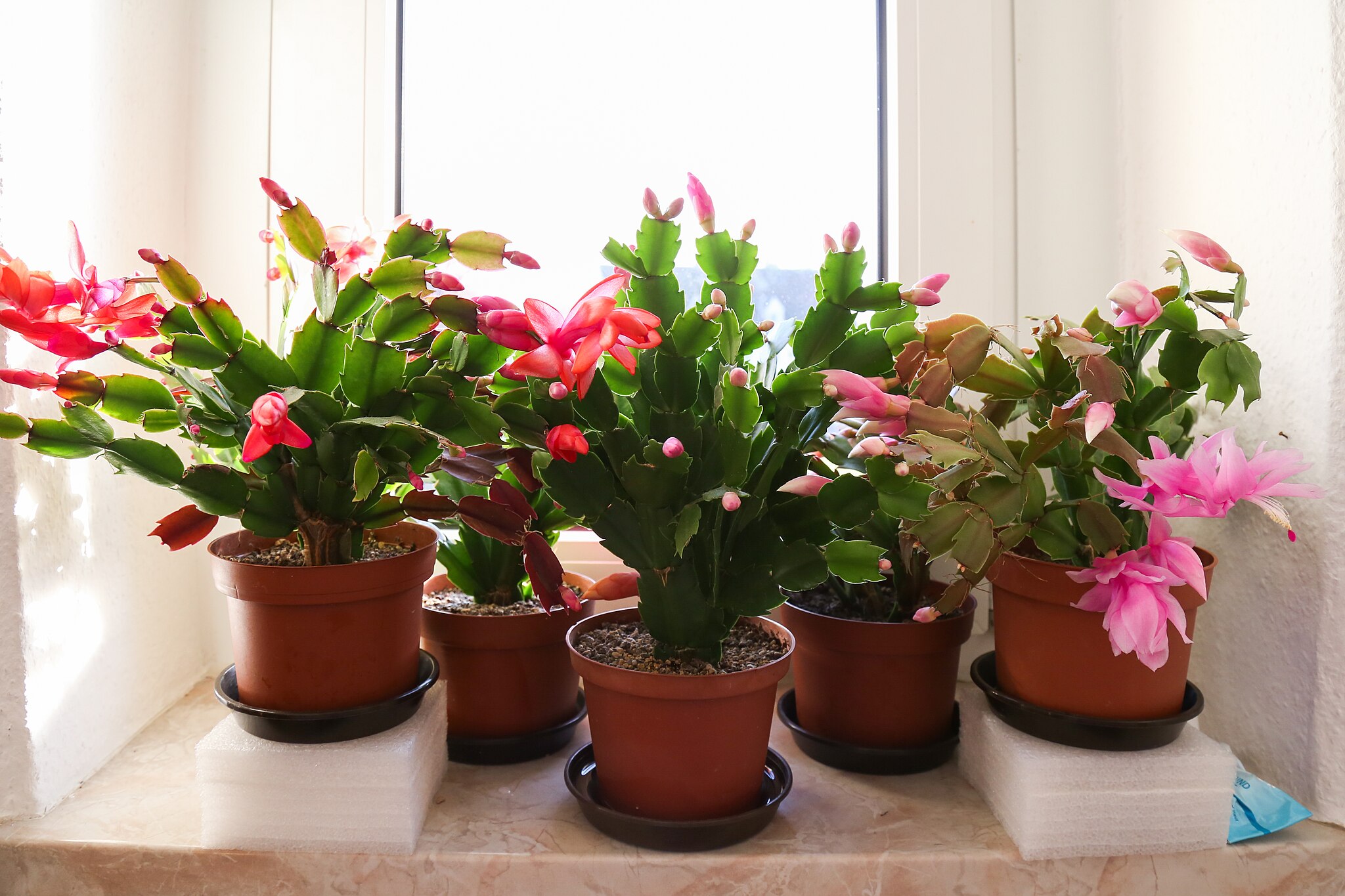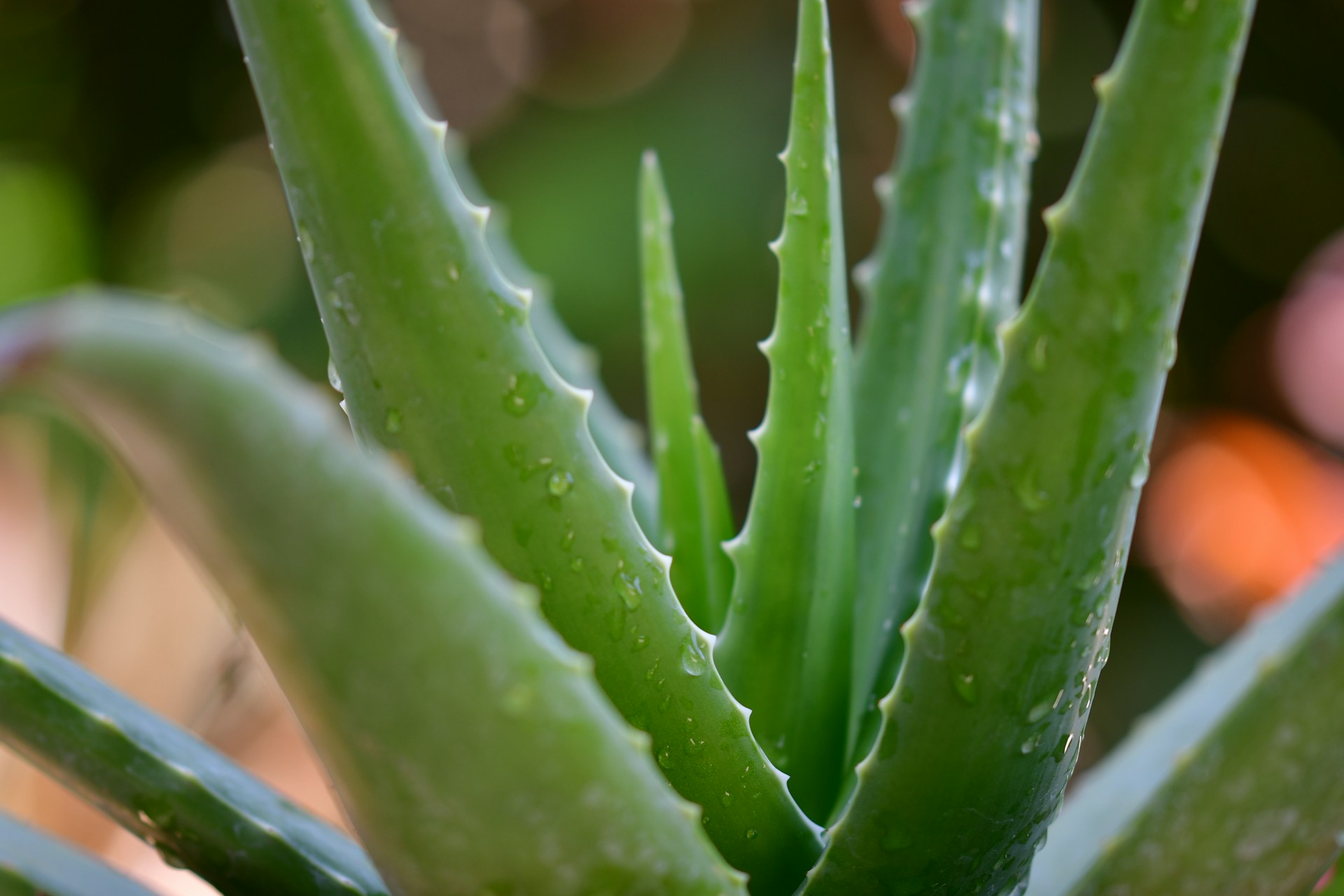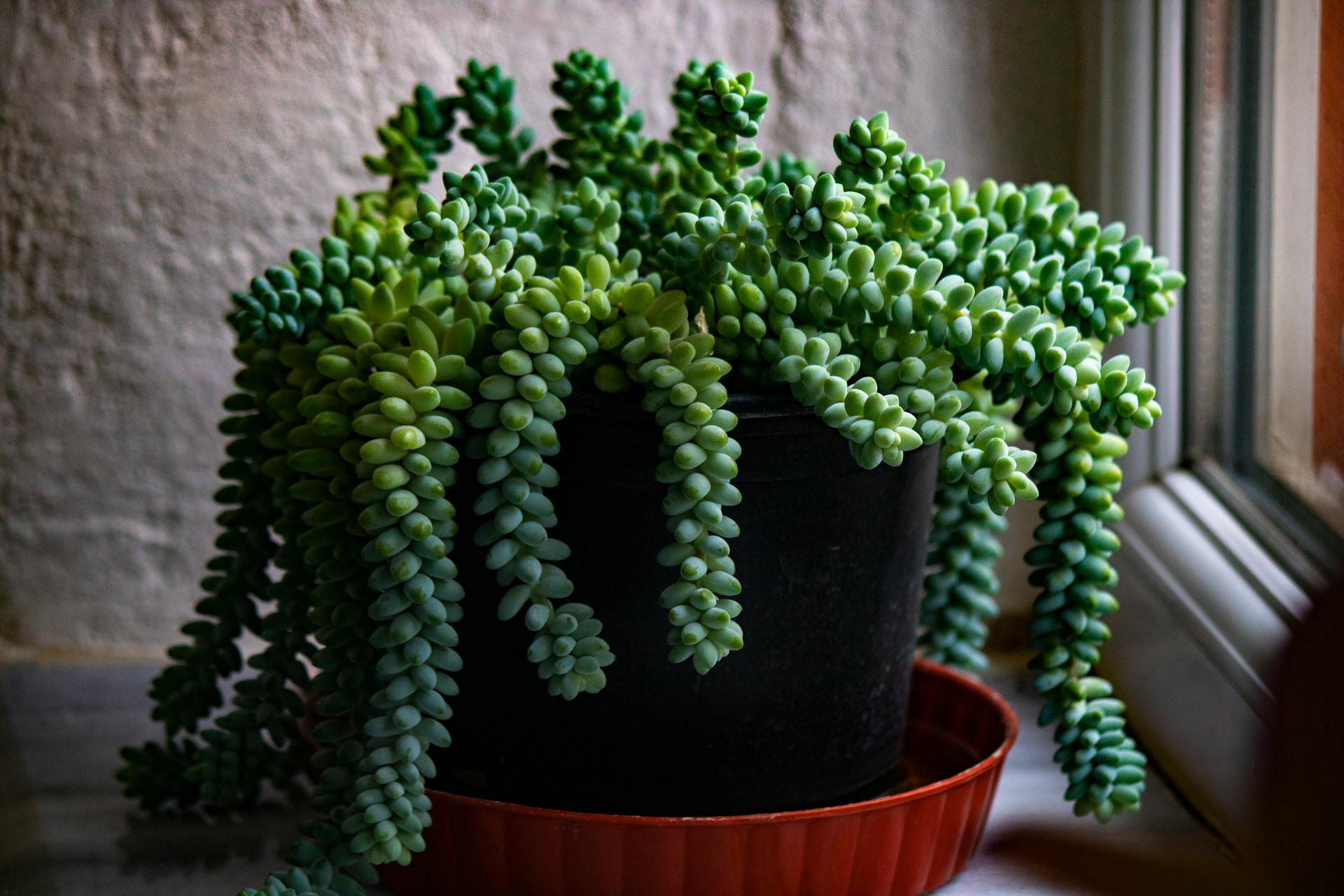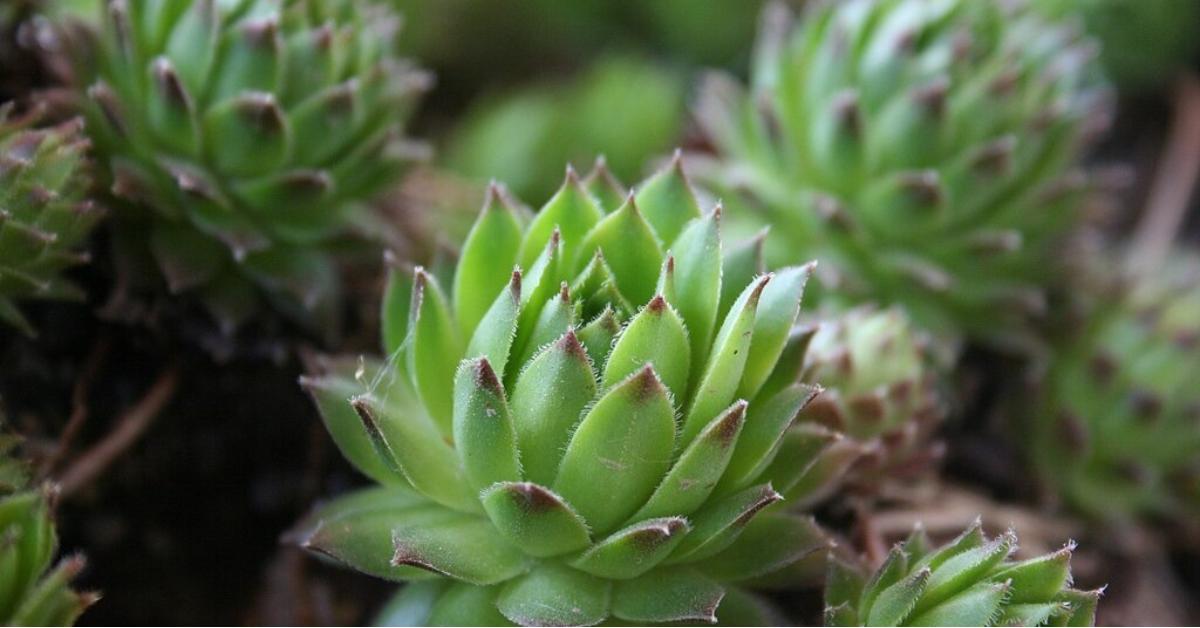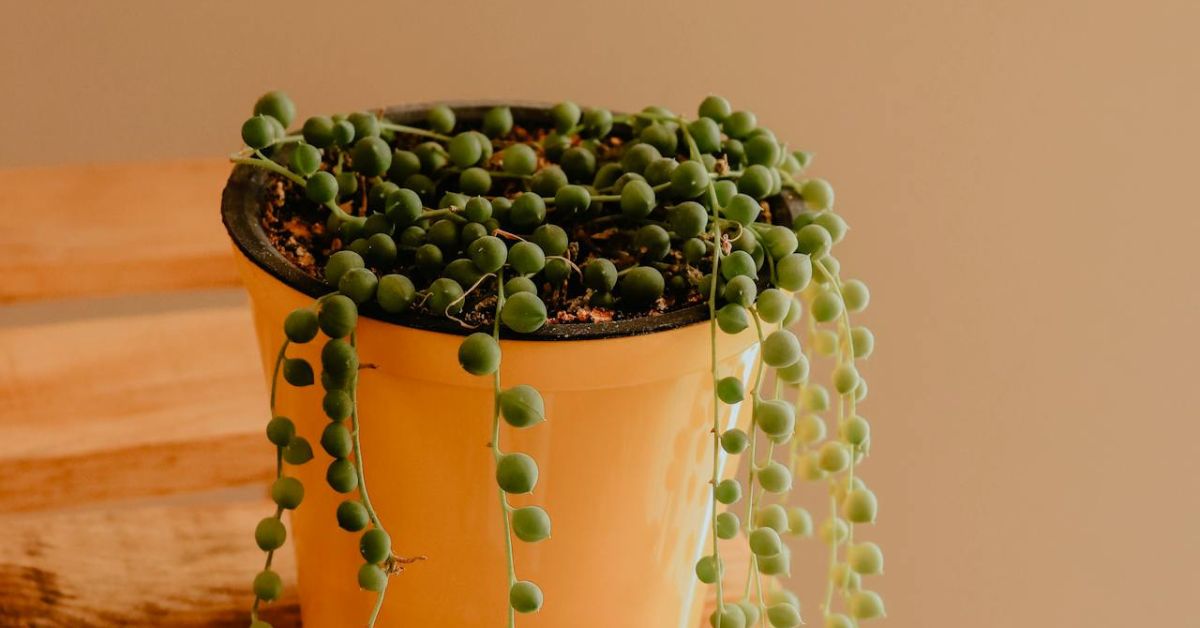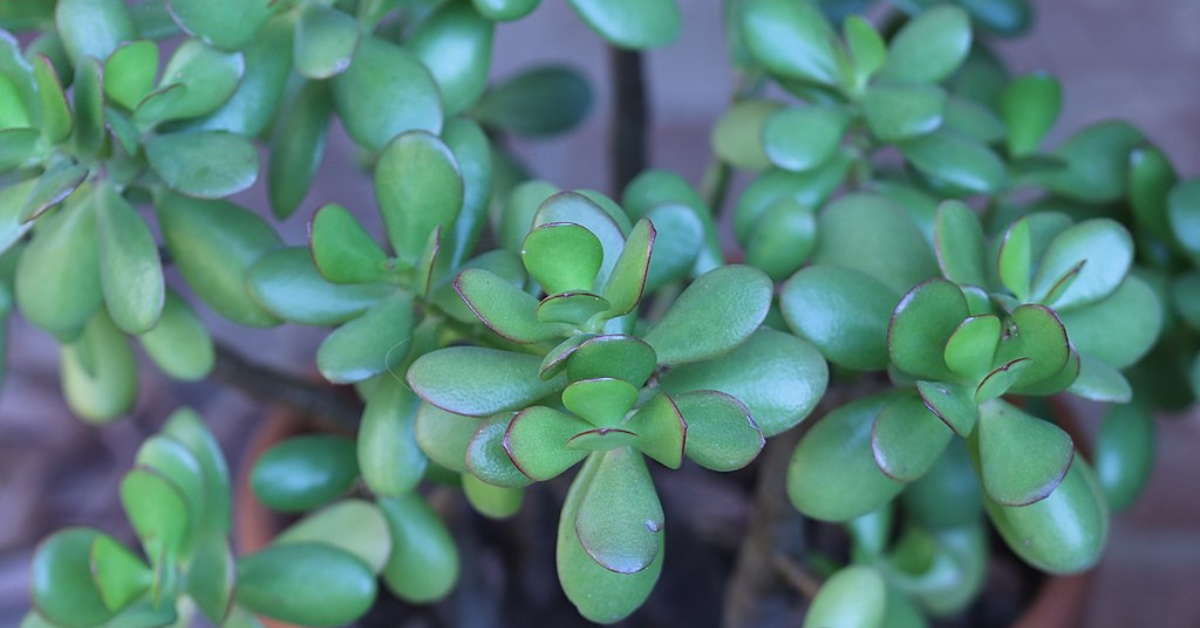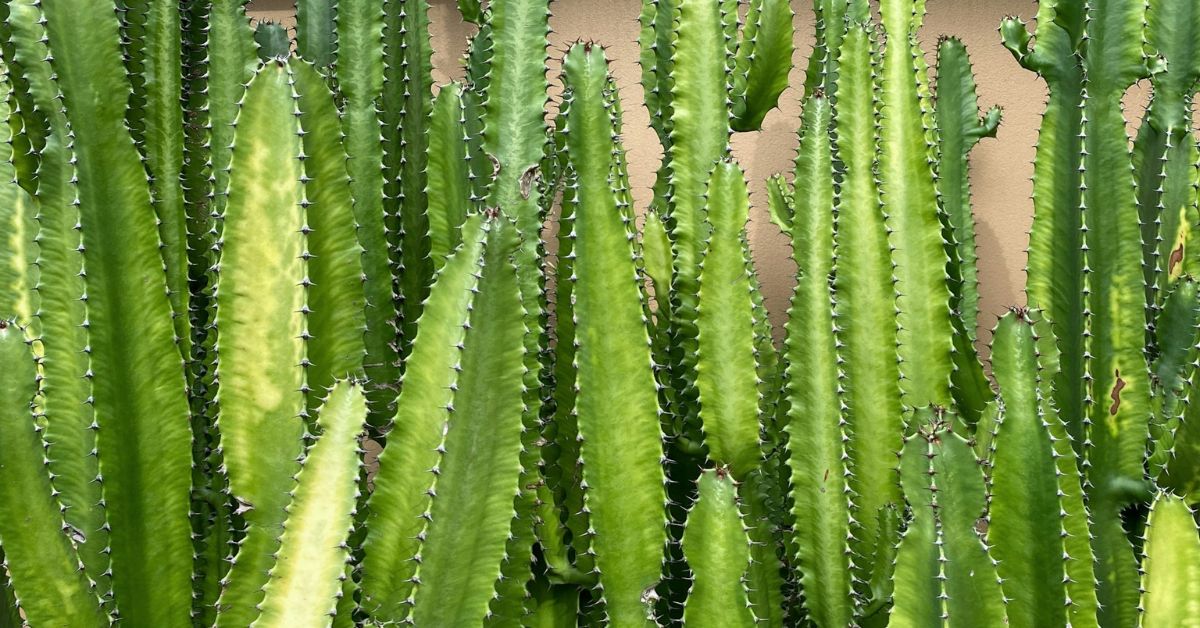IN THIS ARTICLE
Christmas cactus or Schlumbergera bridgesii (Lem.) Lofgr, is a popular seasonal plant native to Brazil. It thrives in humid and shaded environments. Its unique, flat, segmented stems produce vibrant, tube-shaped flowers in colors such as red, pink, white, or yellow.
Are you feeling unsure about whether to bring a Christmas cactus home? Do you want to know about its light, water, temperature and humidity requirements?
Don’t worry if you’re new to Christmas cactus! taking care of it is quite straightforward! This comprehensive guide will tell you everything you need to know before bringing and taking care of Christmas Cactus.
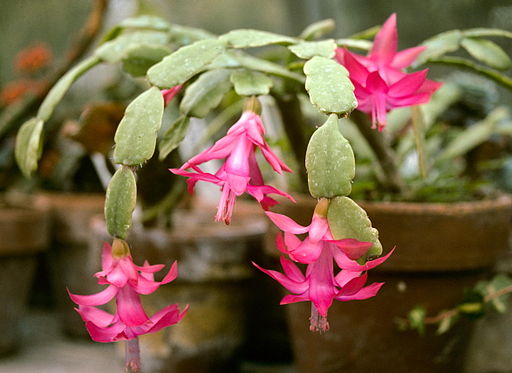
| Christmas Cactus Botanical Name | Schlumbergera bridgesii |
| Family | Cactaceae |
| Plant Type | Succulent |
| Mature Size | 6-12 inches tall and 12-24 inches wide |
| Sun Exposure | Indirect light |
| Soil Type | Well-drained, sandy soil |
| Soil pH | Slightly acidic to neutral (5.5-6.5) |
| Bloom Time | Winter |
| Flower Color | Pink, red, white |
| Hardiness Zones | 10-12 (USDA) |
| Native Area | Brazil |
Types of Christmas Cactus
Here a quick look on the different types of Christmas Cactus plant, each with unique features and benefits:
| Name | Grown Indoors? | Unique Features |
|---|---|---|
| Christmas Cactus (Schlumbergera bridgesii) | ✓ | Blooms in December, with flat, scalloped-edged segments. |
| Thanksgiving Cactus (Schlumbergera truncata) | ✓ | Blooms in November, with pointed, claw-like segments. Color varies from orange to lavender. |
| Easter Cactus (Hatiora gaertneri) | ✓ | Blooms in spring, with rounded segments and star-shaped red, pink, and purple flowers. |
How to choose the right Christmas Cactus Plant
Its is not too hard to choose from only three types. If you are at a nursery then you should know what you have to look for when selecting the Christmas Cactus plant from the nursery. We have compiled some simple tips:
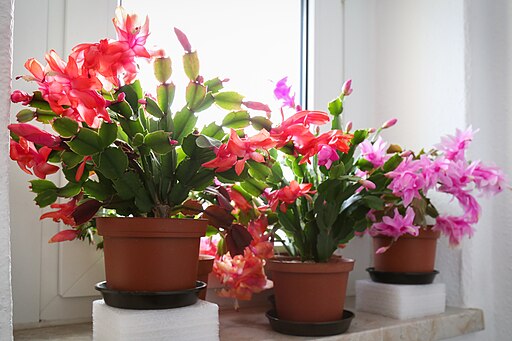
| Look for | Comments |
|---|---|
| Lively color | Choose plants with vibrant, healthy-looking green segments. Avoid yellowing foliage. |
| Sturdy leaves | Select plants with firm, plump segments. |
| No damage | Ensure there are no broken stems or damaged segments. |
| No disease | Check for any signs of disease, such as spots, mold, or mildew. |
| Size | Consider the size of the plant in relation to where you plan to place it. |
| Shape | Select a plant with a symmetrical shape. |
| Environment | Consider the environment in which you’ll be keeping the plant. Ensure it matches the Christmas Cactus light and temperature preferences. |
Choosing the Right Pot and Soil
Best pot for Christmas Cactus Plant
A terra cotta pot slightly larger than the plant’s current size is the perfect choice because they allow the soil to dry out more evenly.
| Pot | Specification | Recommended Dimensions (Width x Height) | Comments |
|---|---|---|---|
| Terracotta | Porous, breathable material | 6-8 inches x 4-6 inches | Dries out quickly, so monitor watering. |
| Plastic | Non-porous, lightweight, retains moisture longer | 6-8 inches x 4-6 inches | Ensures good drainage to prevent root rot. |
| Ceramic | Durable, retains moisture | 6-8 inches x 4-6 inches | Ideal for retaining moisture and providing stability. |
| Concrete | Heavy, stable | 8-10 inches x 6-8 inches | Suitable for larger plants |
| Grow bag | Breathable, promotes root health | 6-8 inches x 8-10 inches | Promotes healthy roots and air pruning. |
Best Soil for Christmas Cactus Plant
The best potting soil mix for Christmas Cactus plant is cactus or succulent soil mix.
| Soil | Best Mix | Comments |
|---|---|---|
| Propagation | 50% potting soil, 25% Perline, 25% Coarse Sand Mix | Buy a readymade Seed Starting Mix. |
| Potting Mix for Indoors | 50% potting soil, 50% perlite or coarse sand | Buy a readymade Cactus/Succulent Potting Mix. |
| Potting Mix for Outdoors | 40% potting soil, 40% perlite, 20% coarse sand or gravel | Buy a readymade Cactus/Succulent Potting Mix for outdoor use. |
How to Grow Christmas Cactus Plant Indoors
Get the plant from local nursery or propagate it using stem cutting method. place it in bright, indirect light and keep the soil slightly moist, but not soggy. Feed it with a balanced houseplant fertilizer every two weeks during spring and summer. Around October, provide cooler temperatures and less water to encourage blooming.
How to Grow Christmas Cactus Plant Outdoors
To grow a Christmas cactus outdoors, place it in a shaded area where it gets indirect sunlight and protect it from extreme temperatures. To get the plant you can visit the local nursery or propagate it from other plant using the stem cutting method.
Propagating Christmas Cactus plant: Step-by-Step Propagation
Stem Cutting is one of the best methods for propagating christmas cactus plant.
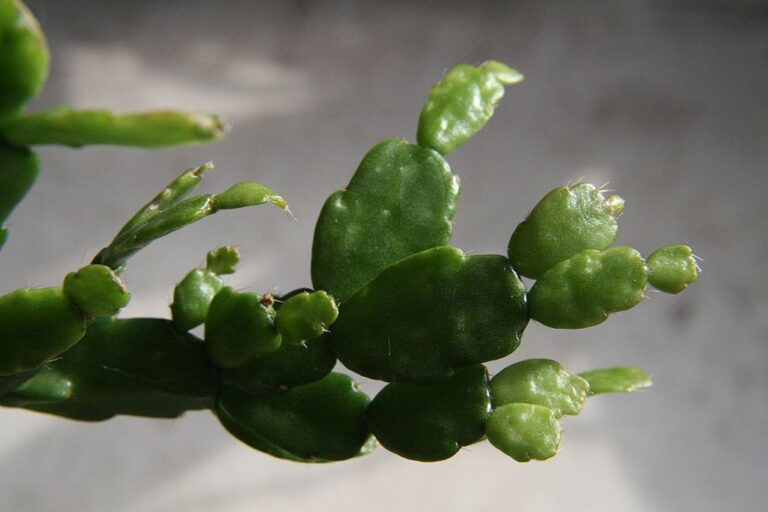
| Propagation Method: | Recommended | Difficulty | Comments |
|---|---|---|---|
| Stem Cutting | ✔ | Easy | Most common and effective method. |
| Leaf Cutting | ✘ | Moderate | Less common and takes longer compared to stem cuttings. |
| Seed | ✘ | Hard | Time-consuming with slow growth |
| Division | ✘ | Moderate | Christmas Cactus doesn’t produce pups or clusters suitable for division. |
Preparation for propagating the Christmas Cactus Plant:
| Topic | Items | Comments |
|---|---|---|
| Safety | Gloves & Scissors | |
| Source | Stem or Leaf Cutting | Get your selected source item for propagation. |
| Soil | Propagation Mix | Use or make the appropriate propagation mix for best results. |
| Pot | Terracotta Pot | |
| Others | Repotting Mat | A good repotting mat constraints the mess created during the procedure. |
Propagating Christmas Cactus plant from Stem Cutting:
- Take a Cutting: Gently twist off a section of the plant with 2-3 segments.
- Let It Dry: Let the cutting sit in a dry, shaded place for a day or two. This helps the cut end to heal and prevents rot.
- Plant the Cutting: Place the cutting into a small pot filled with moist, well-draining soil. Make sure the bottom segment is in the soil.
- Water Lightly: Water the cutting lightly, keeping the soil slightly moist but not soggy.
- Provide Bright, Indirect Light: Place the pot in a bright spot with indirect sunlight. In a few weeks, you should see new growth, indicating that the cutting has rooted.
How to Care for Christmas Cactus Plant
Here is the brief information on how to take care of a Christmas cactus plant like lighting, watering and all basic care needs of your Christmas Cactus:
| Needs | Ideal State | Avoid | Frequency (if applicable) | Recommendations |
|---|---|---|---|---|
| Light | Bright indirect sunlight | Direct, intense sunlight | N/A | Use sheer curtains to diffuse sunlight |
| Air Circulation | Good airflow around the plant | Stagnant air | N/A | Place the plant in a well-ventilated area, especially indoors. |
| Watering | Allow top inch of soil to dry out between waterings | Overwatering | Every 2-3 weeks during growing season, less in dormancy | Use room temperature water, reduce watering in fall and winter |
| Fertilizer | Use diluted fertilizer | Excessive fertilization | Every 4-6 weeks | Fertilize during growing season |
| Temperature | 60-70°F (15-21°C) | Frost or extreme heat | N/A | Keep the plant in a stable environment. |
| Humidity | Moderate humidity levels | Extremely high or low humidity | N/A | Mist the plant occasionally if air is very dry |
| Pruning | Occasional to control size and shape | Over-pruning | After blooming season | Remove any dead or damaged parts |
| Repotting | Repot every 2-3 years as needed | Frequent repotting | Every 2-3 years | Repot after the blooming period |
| Pest Control | Inspect regularly and use natural pest control methods | Overlooking pest infestations | As needed | Use natural or chemical treatments as necessary. |
How to Prune Christmas Cactus plant and remove dead leaves
Remove any dead or wilted leaves or stems with clean, sharp scissors or pruning shears. Make cuts just above a leaf joint or node, and the plant will often branch out from there.
How to Repot Christmas Cactus plant Step by Step
Signs that indicate the need for repotting Burro's Tail Plant:
It’s time to repot your Christmas cactus if:
- The roots are tightly packed and visible at the surface of the soil.
- The plant is becoming too large for its current pot.
- The soil drains poorly, leading to waterlogged roots.
Choosing a New Pot and Soil for Burro's Tail Plant:
- Select a pot that is larger than the current one and has drainage holes at the bottom. Use a well draining soil mix.
Steps for Repotting Christmas Cactus Plant:
- Unpotting:
- Gently remove the plant from its current pot.
- Shake off excess soil and inspect the roots for any signs of damage or rot.
- Trim away any unhealthy roots.
- Planting:
- Place a layer of fresh soil in the bottom of the new pot and position the plant in the center.
- Fill in the gaps around the roots with more soil, pressing it down lightly to secure the plant.
- Watering:
- Water the plant lightly to help settle the soil.
- Place the repotted Christmas cactus in a location with bright, indirect light and avoid watering for a few days to allow the roots to adjust.
Christmas Cactus Plant Common Problems and Solutions
Below are the common problems and solution associated with christmas cactus.
Root Rot in Christmas Cactus Plant
Root Cause: The most common issue is overwatering, which can lead to root rot and other problems.
Solution: To overcome this, make sure the pot has proper drainage and let it dry between watering.
Wilted Leaves in Christmas Cactus Plant
Root Cause: If the Christmas cactus is not watered enough, it may become dehydrated and wilted.
Solution: Water the plant when the top inch of soil feels dry to the touch.
Lack of Blooming in Christmas Cactus Plant
Root Cause:If you are wondering why Christmas cactus is not blooming, it is because it doesn’t receive the right conditions or undergo the necessary period of darkness.
Solution: Provide it with 12-14 hours of darkness each night for 6-8 weeks leading up to the blooming period.
Leaf Drop and Leggy Growth in Christmas Cactus plant
Root Cause: The insufficient light can cause some problems like falling off leaves, stems becoming long and stretched out.
Solution: To tackle this move the plant in a bright place with indirect light and prune back leggy stems.
Pest Infestation in Christmas Cactus plant
Root Cause: Spider mites or mealybugs infest Christmas cacti.
Solution: Treat the plant with an appropriate insecticide or gently wipe the pests off with a cotton swab dipped in rubbing alcohol.
Dropping Buds in Christmas Cactus plant
Root Cause: Sudden changes in temperature, drafts, or stress can cause the dropping of buds.
Solution: Keep the plant at consistent temperature and humidity levels. Do not move it too much.
Conclusion
The Christmas Cactus plant is like a friend who shows up at your door on Christmas with beautiful red flower gifts. When you follow the guide we provided in this article, you will never be unsure of anything about the Christmas Cactus.
By properly propagating, caring for, and repotting your Christmas Cactus, you will experience the joy you desire as a plant parent.
However, always keep in mind the common problems we discussed. Be cautious of pests, and if you find any, you’ll know what to do.
With these tips, you’ll confidently grow and care for your Christmas Cactus, enjoying its beauty for years to come. You also don’t need to stick to only one succulent; if you want to explore more, try Aloe Vera and the Burro’s Tail Plant.
Frequently Asked Questions
What do Christmas cactus seeds look like?
Christmas cactus seeds are small, round, and light-colored, typically found inside the fruit of the plant.
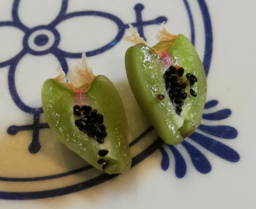
Jérôme, CC BY-SA 4.0, via Wikimedia Commons
How do you get a Christmas cactus to bloom?
To get a Christmas cactus to bloom, provide it with cooler temperatures, less water, and 12-14 hours of darkness daily for about 6 weeks.
Why do Christmas cactus leaves turn red?
Red leaves on a Christmas cactus often indicate stress from too much light or insufficient nutrients.
How to address Christmas cactus dry leaves?
To address dry leaves, water the plant more regularly and ensure it is not exposed to excessive direct sunlight.
What to do if your Christmas cactus is not growing?
If your Christmas cactus isn’t growing, check for proper light, water, and nutrients, and repot if root-bound.
Are Christmas cactus toxic to cats or dogs?
Christmas cacti are non-toxic to cats and dogs, making them safe for households with pets.
Are coffee grounds good for Christmas cactus?
Coffee grounds can be beneficial in moderation, providing nutrients and improving soil acidity slightly.
Will Christmas cactus root in water?
Yes, Christmas cactus cuttings can root in water, but rooting in soil is typically more effective.
How to revive a shriveled Christmas cactus?
To revive a shriveled Christmas cactus, water it thoroughly, ensure proper humidity, and avoid direct sunlight.
Is Christmas cactus a good indoor plant?
Yes, Christmas cactus is an excellent indoor plant due to its attractive flowers and ability to thrive in indoor conditions.
Does Christmas cactus need sun or shade?
Christmas cactus prefers bright, indirect light. Too much direct sunlight can cause the leaves to burn.
Where is the best place to plant a Christmas cactus?
The best place to plant a Christmas cactus is in a location with bright, indirect light, such as near a north or east-facing window.
